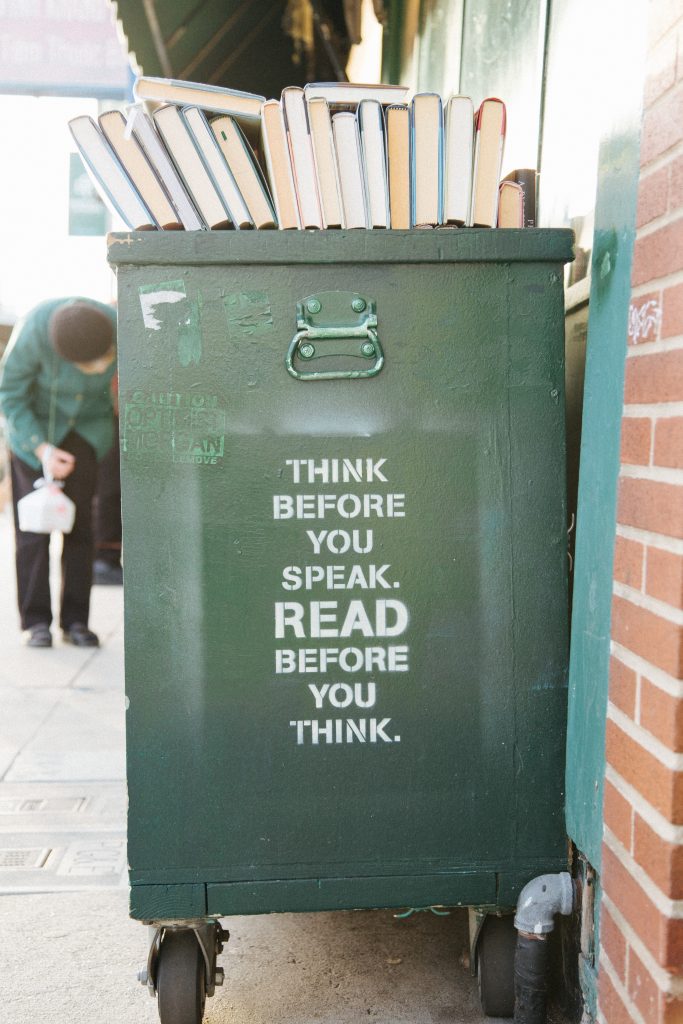10 Things You Shouldn’t say to Someone with a Mental Illness

Mental illness is one of those topics that begs discussion but is shrouded in taboo. The discussions will bring about questions that need to be answered. As well as comments that need to be addressed. Social media has made sharing our stories much easier than ever before. Now we can find entire communities were we will be supported no matter what mental illness we may have. To the affect, speaking about mental illness will inevitably bring it to the forefront of pubic interest. While this may be the case, it is important to remember the pitfalls that are present. With this list, Psych2Go aims to warn readers of those comments that should not be made. No matter how “helpful” they are believed to be.
1. It’s all in your head
The issue with mental illness is that it is literally all in the head, just not in the sense that this comment makes it out to be. Mental illness isn’t a mind over matter issue. It rarely, if ever, actually goes away from the power of positive thinking alone. By telling the sufferer that their mental illness is all in their head they are actually being told that their illness isn’t all that important. The truth of the matter is that mental illness often needs close medical care and attention. Otherwise it can become severe and debilitating. Telling the sufferer that their illness is simply in their head diminishes everything that they go through with it.
2. Get over it
Someone who suffers from mental illness would love to just get over it. The issue is that it isn’t a reality for them. Would you tell someone with a broken leg to just walk it off? No, you wouldn’t. You would see the physical ailment for its severity and you would want to help alleviate their pain. So why don’t we do that with mental illness? In a perfect world mental illness would be treated like any other illness or injury. This of course isn’t a perfect world so comments like this are ever present among sufferers.
3. It could be worse
This line of thinking minimizes everything about the sufferer and their struggle. You can not compare each person’s struggle to another’s. Each person deals with their struggle in their own way. This may be the worst thing that has ever happened to them so suggesting that it could be worse can lead to one of a few outcomes. The sufferer may see this as you telling them that what they are going through is insignificant. They could even feel that this means you don’t care. Furthermore, the sufferer might then become worried that they could get worse. Which will only add to the frustrations they are already experiencing. One other outcome is that they might feel that they don’t deserve to get help because they aren’t bad enough yet. Any of the above scenarios can and will wreak havoc on the mind of someone already suffering from mental illness.
4. Go out and have fun
Deep down, many mental illness sufferers wish that they could just go out and have fun. Some mental illnesses capture the sufferer for longs stretches of time. Inevitably rendering the idea of fun completely useless or even impossible. This comment is usually saved for those with anxiety or depression. Those that suffer from bipolar disorder or schizophrenia often hear other suggestions. This doesn’t make the statement any less frustrating or demeaning to the sufferer though. This is just one of those comments that, while usually said with the best of intentions, does much more harm than good.
5. Everyone is depressed
While there might be many cases of depression throughout the population it is false to say that everyone has depression. That being said, there is a bigger issue with this statement. It quantifies the illness and compares it to a large cross section without taking into consideration that depression is like a spectrum. Not only is it like a spectrum, with each sufferer having a different degree of difficulty from their illness, it also forgets the different kinds of depression out there. Some suffer from seasonal depression whereas others suffer from chronic depression. Then there are those suffering from post partum depression and all the ones in between.
The fact of the matter is, not everyone has depression and even if they did they wouldn’t have the same kind. One sufferer might not be able to get out of bed for weeks while the other can throw themselves into work. Only to get home and have it all come crashing down. One might have a very active social life but cries all the time while they are home. While another sufferer might hate to be out in the world because it’s too much for them in that moment. Each person has their own relationship with their own depression and its symptoms.
6. It’s because of your medication
Unless you are a doctor, and more importantly that person’s doctor, there is no reason to be giving them that type of medical advice. In many cases people are only able to function with their medication due to the severity of their symptoms. This is not only a very unhelpful statement it can also be a dangerous one. Depending upon the sufferer’s mental illness it may be dangerous to just stop their medication. There are some medications out there that can either worsen symptoms is stopped abruptly or can be deadly.
This statement also alludes to some perceived notion that those who have to be on medications for mental illness are weak. This is completely false as it takes a lot of courage to admit that you need help. Not to mention the act of actually getting that help. This is a conversation that is best left between the sufferer and those that manage their medical care.
7. You can’t be like this forever
The sufferer is already afraid that they will be like this forever and this statement just makes things worse. Mental illness is something out of the control of the sufferer. It can very well be possible that they are like that forever. Medication and therapy can work wonders but they are not instant. It can take years for someone with a mental illness to feel like they are actually present within situations. This statement can also come off as accusatory as if the sufferer just isn’t trying hard enough to get over their illness. Those who suffer from mental illness fight tooth and nail for some semblance of normalcy. This isn’t a willpower battle. You can’t fight something like this alone, you need support from those around you. So yes, the sufferer might deal with this or “be like this” forever but that doesn’t define who they. Or how hard they are working on their illness.
8. But you have so many things to be happy about
This may very well be the case but happiness and mental illness are not mutually exclusive. Many mental illness sufferers have the ability to be happy and enjoy certain situations but may not be able to sustain that happiness. They might have a family or a pet that brings them incredible joy. It just can’t keep them that happy all the time. This statement can lead the sufferer to thinking that they are ungrateful for the things that they have. This may only lead them to feel worse about themselves. It seems that this is another one of those statements that is made with the best of intentions but has the opposite affect.
9. What doesn’t kill us makes us stronger
This is a nice sentiment but yet another one that is more hope rather than actual fact. We can once again put this into the perspective of a physical ailment. We wouldn’t say this to someone who was left paralyzed from the waist down. No, we would offer to help them or at least give some words of encouragement as they tried physical therapy. The sufferer may feel that they are stronger over time but in the moment they may feel like the weakest they’ve ever been. There will already be negative self talk so this statement might leave them asking why they aren’t thankful to just be alive. Mental illness may be the worst thing that the sufferer has ever been through. They may not be able to see the light at the end of the tunnel so this statement only exacerbates things for them.
10. I got over mine so you can too
This statement might seem encouraging and heartfelt but in reality it is poison to the sufferer. This can be chalked up, once again, to the fact that each person has their own specific journey with mental illness. What worked for them may not work for the next person. This can also perpetuate the negative self talk that often accompanies mental illness. Leaving the sufferer wondering what else they are doing wrong. If you feel like you need to offer up some words of wisdom it might be best to stick to the basics.
Let the person know that they have your support if they should ever need it. Let them know that you believe in them and have faith that they are doing the right thing for them. Unless of course they aren’t taking care of themselves which would lead you to a much more important self-care conversation. Knowing that they aren’t alone can be a beacon to someone lost in the maze of mental illness.
Do you know of a statement that is terrible for those with mental illness? Psych2Go invites you to drop it in the comments.
Other reading from Psych2Go:
Gemma Correll’s – Mental Illness Feels Like Art
Mental Illness Recovery Book
Artists Shows How Mental Illnesses Look Like As Monsters
Resources:Berube , Jamie. “10 Things You Should Never Say to Someone With a Mental Illness.” TheMighty.com, Mighty Proud Media, 30 June 2017, themighty.com/2017/06/what-not-to-say-to-someone-with-mental-illness/. Retrieved October 30, 2017
Hill, Tamara. “Frustration: 10 Worst Things To Say To Someone With Mental Illness.” Psych Central.com, Psych Central , 20 Jan. 2016, blogs.psychcentral.com/caregivers/2016/01/10-worst-things-to-ever-say-to-someone-with-mental-illness/. Retrieved October 30, 2017
Tracy, Natasha. “Stop Minimizing Mental Illness: Worst Things to Say.” HealthyPlace.com, Health Place, 5 June 2017, www.healthyplace.com/blogs/breakingbipolar/2010/09/stop-minimizing-mental-illness-worst-things-to-say/. Retrieved October 30, 2017






Thank you for sharing some of my work! <3
You’re very welcome!
Something that makes me want to punch someone is when people say to me “you need to try harder/you aren’t trying hard enough (to get over it)”
That really pisses me off